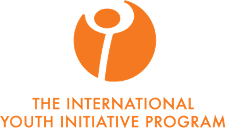Dear Friends of YIP,
I hope this newsletter finds you well wherever and whenever this meets you.
After wrapping up the Lighthouse Festival, where each yippie received a rose, signifying where someone saw them shine throughout the initiative festival process, the community and collaboration module came to a close, and a new chapter began.
Around mid-March, the yippies left their Swedish home while the night skies outweighed the light of day, and the frost still covered the ground. Then, four weeks later, the yippies returned to a Swedish spring unfolding.
YIP is officially back together as one whole community after a month of being scattered in small groups around the globe, learning, sharing, working, serving and engaging in new opportunities to explore questions about the individual in relation to the world. Ytterjärna is blooming, and the sun is out most days, bringing much warmth to our hearts and minds as we step into the early stages of the self-designed curriculum (more on this in next month’s newsletter).
This newsletter is all about the YIP14 learning placements. You will get to read about the various organizations, unique locations and individual experiences from some of the participants of YIP14 about their lives while on their learning placements.
by Bianca Montemarano
In this newsletter you will find:
- Learning Placements YIP14
- Elderberries Café by Tuesday Wulterkens
- The Dream Factory by Ozan Martin
- Kufunda Village by Christianne Huisman
- The Ideas Partnership by Tazin and Lucas
- Navdanya by Friederike Altmann
- Movement Vilnius by Marlene, Elia, Carlotta
- Waking Life by May Wyss
- Shanti Lepra Hilfe by Anika Jensen
- Nyponkulla by Yuna van Dongen and Vicky Si
- Youth Innovators Foundation by Kato van Goethem
- Invitation to YIP14’s Personal Initiative Presentations
- YIP15 Applications Update
YIP14 Learning Placements
An important part of the YIP curriculum is the Learning Placement. After gaining a deeper understanding of the big challenges of the outer world, exploring the inner life and co-creating and organising a 5-day Festival, YIP14 embarked on their Learning Placement – four weeks in a new context, with a new community, learning from societal entrepreneurs committed to creating a positive change in the world.
The process leading up to their adventure was long and extensive. It started back in August, in the first week of YIP. The Yippies were encouraged to focus on an individual learning question that would guide their interest throughout the phase of orientation, choosing, planning and working with the organisation. It’s the question that guides and supports us to become active and curious learners in the world.
This year many old and new friends of YIP generously welcomed the Yippies into their Organisations and communities. We deeply thank you for your hospitality and openness to share your time and wisdom with the Yippies. They returned with many inspiring stories, which we believe will continue to unravel and spark new learnings in the years to come.
An essential part of the Learning Placement is the relation between the individual and the collective. One of the phases in which this becomes apparent is when the Yippies activate to gather the necessary funds to make the Learning Placement possible. How can we collectively take responsibility to work towards an equitable opportunity for everyone to go to the organisation in the field of their interest? With apple juice and bake selling, concert catering, a craft & arts stand, an amazing cookbook full of YIP14’s favourite recipes, a stunning magazine with impressions from YIP, a sponsored run and many heart filled donations from family and friends, it was possible for all the Yippies to go on their Learning Placement. On behalf of YIP, we thank you all for supporting them on their journey.
After a month, filled with experiences, stories, new thoughts and questions, the Yippies have returned to their YIP home and are now moving into their self-guided learning in the last phase of YIP. We are thrilled to see how their learnings of the past weeks have become a part of their individual life paths and how they will integrate this into being of service to the world.
Warm greetings,
YIP Organising Team
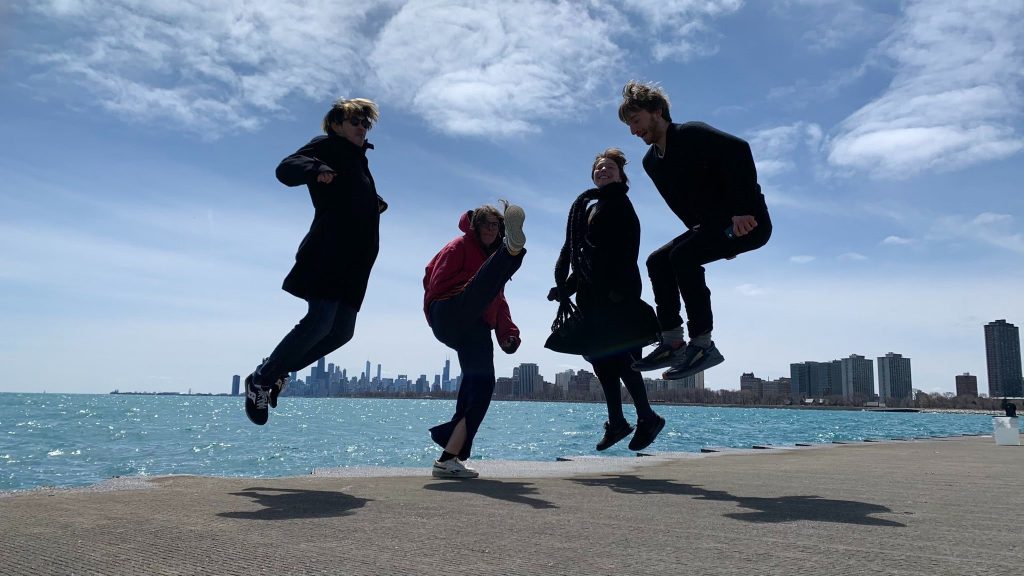
Elderberries Threefold Cafe
– U.S.A –
As I am writing this, we are close to the end of a wild and crazy journey throughout the United States of America with the Elderberries Cafe, a three-folding space where everyone is welcome and people work hard towards building relationships and community. The Cafe started in Hollywood and has now moved with Frank and Zuri (our super crazy, wonderful and slightly chaotic hosts) to Chicago. This is where our ‘learning placement’ journey began.
We had three days of organizing workshops with the Thresholds community (a community and school for foster youth), after which we organized an open mic to bring some post covid life back into the space. These events made me realize how strong the power of bringing people together in a space is and how everybody has something to offer, whether they believe that’s true or not. I also realized how much I miss being on stage, a very selfish but true realization.
After a week or so, we moved to Detroit. Different reality. I already experienced a culture shock in Chicago, seeing the immense difference between the rich and the poor, the left and the right, the black and the white, but Detroit was something else. This city declared bankruptcy a while ago and almost a third of the houses I saw were empty. Yet it blew me away how much people cared about their community and how all of the heroes we met were working so hard towards the things they wanted to see in this world.
I came to America with a question. How can we find understanding and peace through storytelling (film, theatre, etc.) and how do we overcome the single story. I came to the right place. First of all, I had a picture of what America looks like through Dutch media (scary Republicans with guns, famous people and lots and lots of money) and television series like Friends and That 70s show. This is not the full story, I very quickly realized. Secondly this country is the most divided or segregated place I have ever seen, I almost felt like people were purposely trying to not understand each other. Last, this is a place of so many opportunities, and I am not talking about the American Dream. I am talking about making an effort to listen, to understand, to see reality and live into it. There are so many people and everything is moving at the speed of light all the time, which for me, made it easy to step in and make the things I want to see in the world. There is always someone crazy enough to say yes.
Our last and longest stop was New York. I don’t have a lot to say about upstate New York, it wasn’t really my place I guess. But that, in itself, made me think about where I do want to be and where I let destiny lead my way and where I create my own path. Where I find a sense of belonging and where I don’t. On that note, the only place in New York I could feel belonging seeping back into my heart and soul, was the city. I have traveled a lot, but never ever in my life have I seen a place like this. It was like the whole world had decided that this was the place where we would meet each other and live inside some crazy movie. Everything happened at the same time and everyone was in it together. Everything I dreamed of as a child, suddenly seemed up for grabs (which I know it is not. People work hard.) I fell in love with the high buildings, the people, the movements and the movie scenes. If my passport would have allowed it, I would stay here for a long long time. I loved the work that Elderberries was doing, the place where everyone can have a place, no matter where you came from. What matters is that you are here.
I found the place I want to be for now. However, in three days, we are returning to Sweden and I can’t wait to see my friends again. So long America, see you soon.
by Tuesday Wulterkens
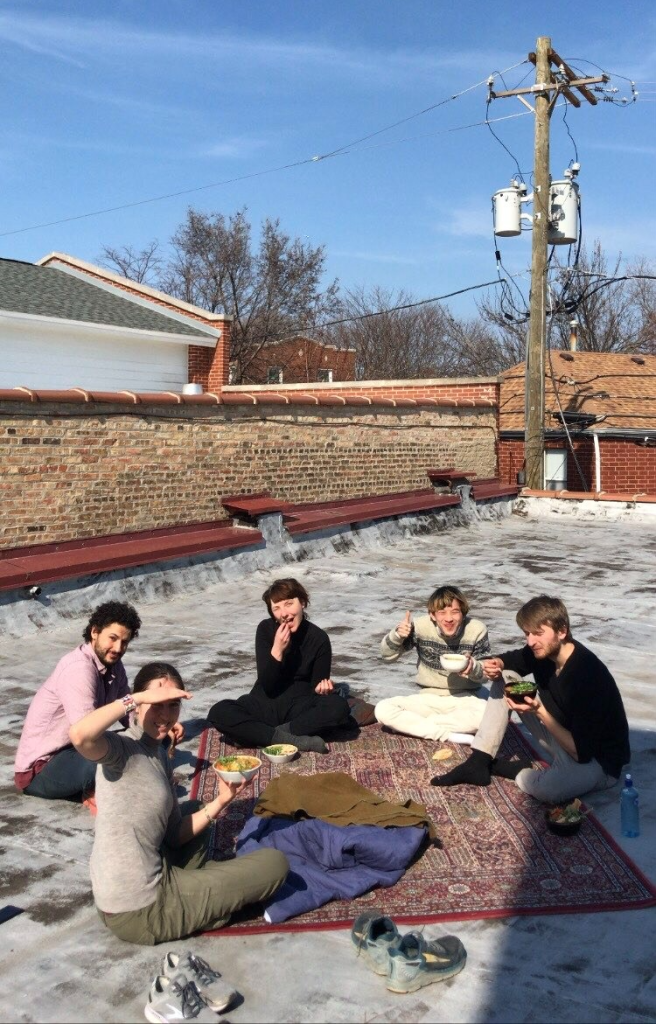
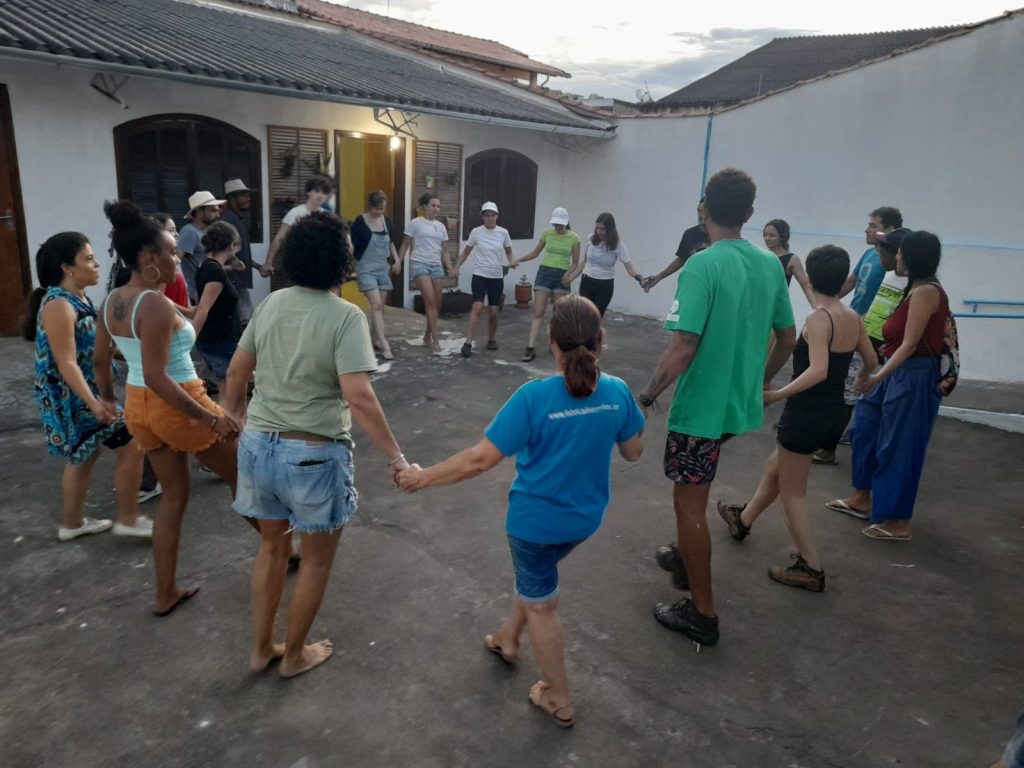
The Dream Factory
– Brazil –
Here in the Dream Factory, community and creativity is cultivated and brought to the forefront to allow people to dream. During our time there, we were given free reign to remake and develop the work space of the dream factory organization as we saw fit. Whenever I came to our host Myrian about a new idea I had, she would agree to it before I was even able to get the thought out!
Our first week was all building up to the Oasis Game where people from all around the town came to help in completely redesigning the Dream Factory headquarters over the weekend. During this weekend, people from all walks of life came to help in this project and was open to any individual passing by on the street. Working in such an environment almost felt like playing at the same time, one moment we are all hard at work, the next we are all dancing as we wait for the rain to pass. From painting plant pots to creating a slide from scratch, the amount of hands at work gave so much potential for change in such a short period of time.
What even changed more than the space around us were the people themselves. New connections were built and Myrian was able to create a strong sense of community and belonging, thereby changing many peoples lives. We had for example a homeless man who was an alcoholic and drank every day from the age of 14 onwards. He was welcomed in the community and without denial not completely sober on the first day worked hard to change the space around him. Just this one day in which he found a meaning and sense of belonging gave him the strength to resist his urge to drink the following day. Sunday was the first day he didn’t drink in years.
Another example would be an artist who throughout the years started to lose hope not only in his abilities to create art but also in the township of Sao Lourenco and the people around him. The Oasis game brought him back to his passion and even though he had planned to give up he decided to give himself one more chance. The very next day he hosted a community painting session with local children to paint local walls to bring colour to the town.
The impact that the Oasis game had on all these lives including the two I just mentioned was especially felt at the end of the last day.
While we all stood in a circle many people felt called to express their gratitude to Myrian and Herbert. We didn’t need to understand the language in order to feel the effect of their words cultivated by the experiences they had and memories they made during the Oasis game.
by Ozan Martin
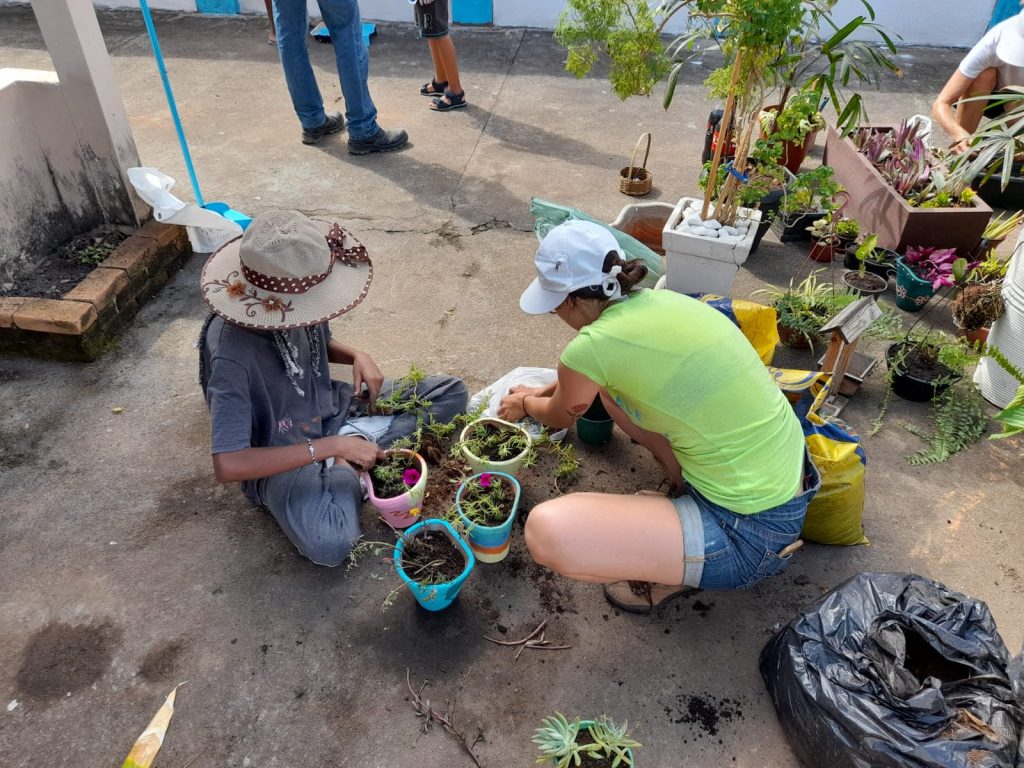
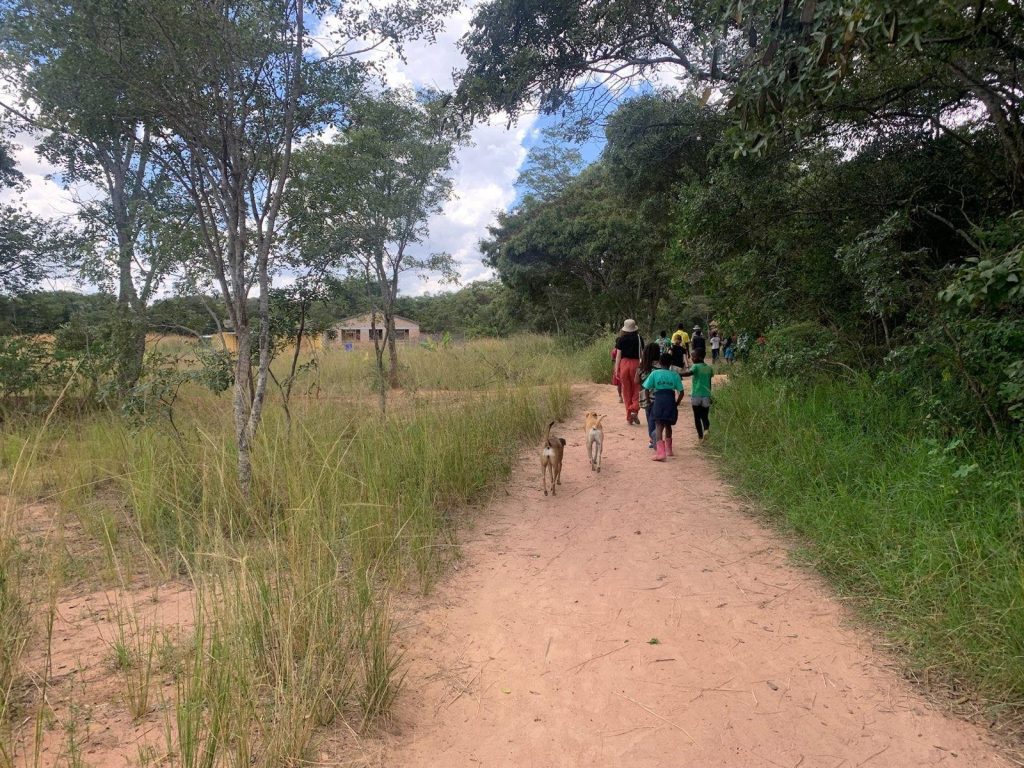
Kufunda Village
– Zimbabwe –
Kufunda means learning in Shona, which is the main language of sixteen official languages spoken in Zimbabwe – where this village is located. It’s a community with a Waldorf inspired school, full of biodynamic practices and a community outreach program that aims to empower youth, women, and surrounding communities.
Three of us Yippies decided that we wanted to learn from this organisation and all it has to offer. The travel was far and tiring and upon our first arrival, Pippin was put in the back of the truck with our luggage! Culture shock one, the first of many…
As we landed and explored, we were helped and guided by another volunteer, coincidentally from Sweden, who showed us the village, how the stove worked and a lot more.
Our time there was spent in the school, garden and outside the village with the ‘communiversity’ team.
In the school we helped with handwork, painting, drawing, gardening and English. We had lots of different experiences, from arriving and being asked what we had planned to being not able to help at all. However, the time spent with the children was beautifully meaningful. As we didn’t speak Shona we had to rely on English and body language to communicate.
The gardening was more Pippin’s area of expertise. From helping with the biodynamic preps, full of female cow components, to weeding and composting, he felt right at home!
Maya’s and my involvement lay more in the communiversity. This team that is responsible for the organisation of workshops, women’s circles, and other programs and activities.
We accompanied the team to a meeting with Young Africa, a vocational centre that concerns itself with youth that have ‘fallen through the societal cracks’. Here one can learn a trade, from hairdressing to bricklaying to sewing or welding. There are a lot of courses on offer to help empower youth to become employable or start their own business. Kufunda is interested in this organisation because they would like to start something similar in the village. We also helped organise a women’s circle and co-hosted a girl’s circle.
The place and its people are profound change makers from whom we learnt a vast amount.
From how to not rely on running water or consistent electricity to understanding the liberating spontaneity one tends to stereotype as African timing and much, much more. We also learned, with great admiration – of truly how meaningful and opulent nature is and how far removed the West is from this perspective.
In hindsight, this is just one small and personal experience from a little village in one of more than fifty African countries, so it doesn’t speak to all the diversity and variety in this beautiful continent – yet it speaks to an impactful profundity gifted to us by the incredible Kufunda Village.
by Christianne Huismann
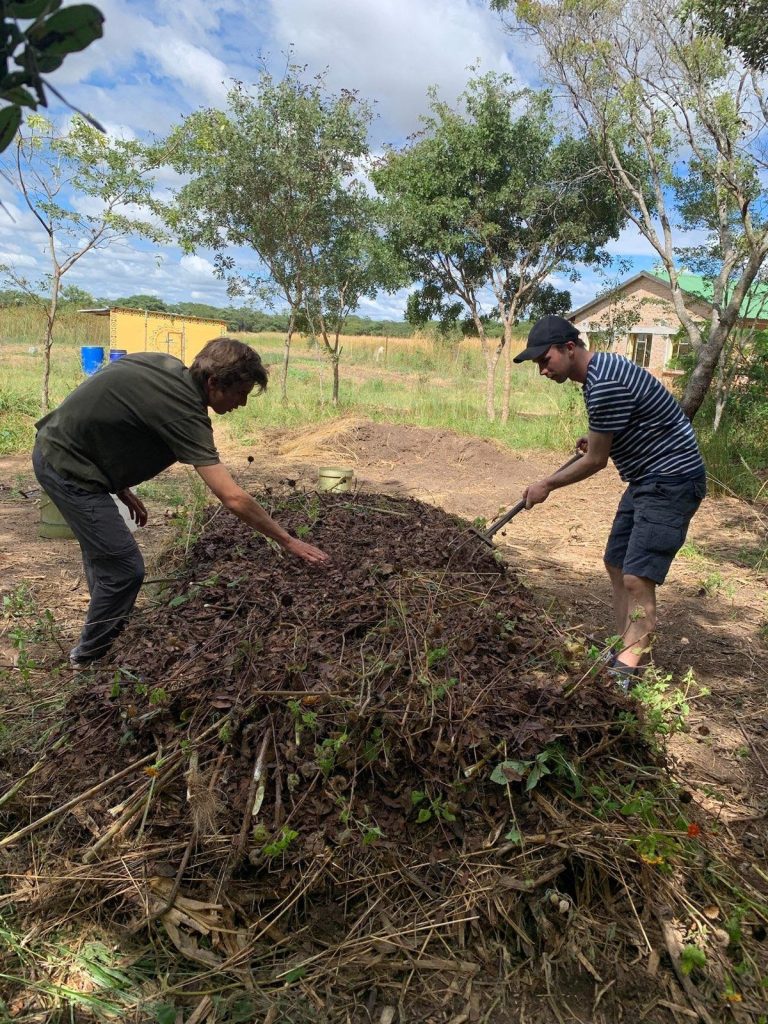
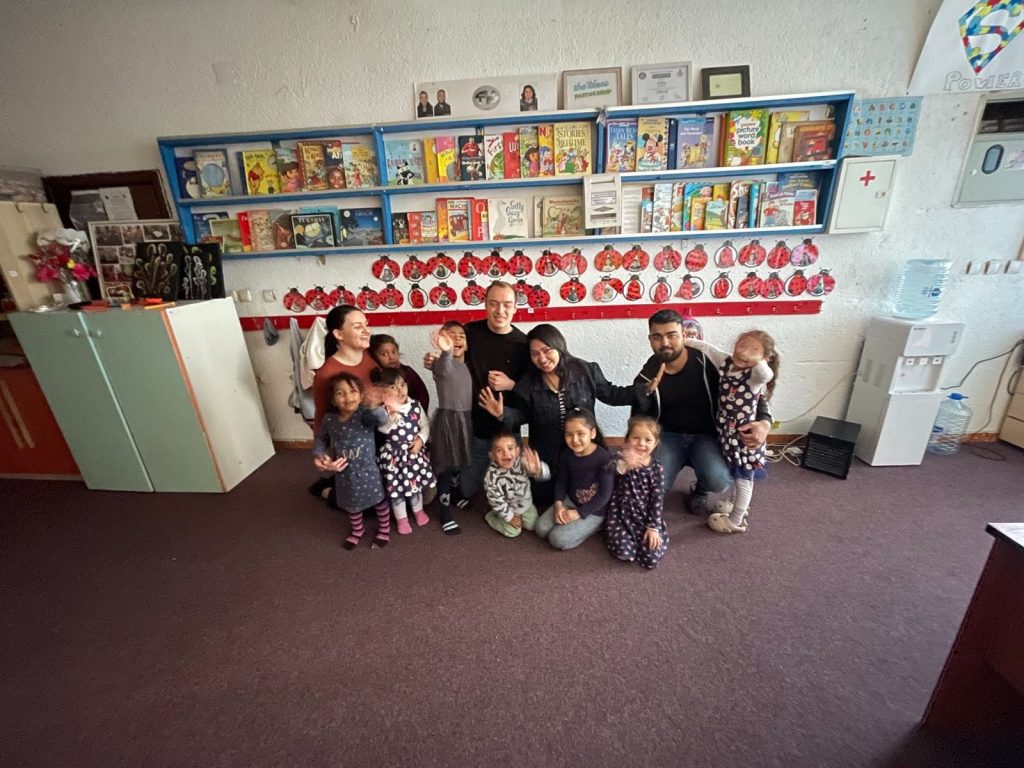
The Ideas Partnership
– Kosovo –
The Ideas Partnership (TIP) is a small and extremely cost-efficient NGO, greatly depending on the amazing support of the volunteers, friends, and partners. TIP’s mission is to empower and support those in need in Kosovo in the fields of education, health, welfare, and cultural heritage, and the protection of the environment, promoting the ethos of volunteerism and philanthropy.
TIP mainly works with Roma, Ashkali and the Egyptian community of Kosovo in the areas of Education and Empowerment. TIP has many different centres spread out through the various municipalities in Kosovo. The organization works in several different areas by hosting activities in Education, Health, Women’s health, and literacy classes and hosting several extracurricular activities for children and adults.
As a team of two, we decided to volunteer in Kosovo since we were interested in the different existing projects related to the minority groups of Kosovo. We volunteered at various centres of TIP five days a week from nine to five, working mainly in the kindergarten in the morning and then working with older children and sometimes also adults in social work and education. We also got the opportunity to interview people from the communities in Fushe Kosove, where we worked to spread awareness and raise funding for TIP, which was a gratifying and exciting process.
Additionally, we also had the opportunity to learn some basic Albanian while there, which also helped us with our volunteer work. Together with learning some basic Albanian, we were also able to experience some of Kosovo’s culture, which was very open and welcoming toward us. The people in Kosovo tend to be very open and friendly. Kosovo is also a very young country both in terms of the age of the nation but also in the average age of the population being around thirty, which makes it a pretty lively country. They also have diverse cultures, food, and traditions which we enjoyed immensely.
Additionally, Kosovo is a very beautiful country, and we got the chance to visit some of the beautiful cities and places there, such as Prizren, Gjilan, Ferizaj and a few more. Furthermore, we got to try the different types of cuisine they have all around Kosovo during this trip, most notably to meet new people, and we managed to make many new friends. While we were there, we also got invited to the village of a friend of ours in Kosovo, which was a lovely experience and interesting to see the many different ways of living amongst the people of Kosovo.
However, unfortunately, Kosovo is still facing some quite significant issues in poverty, a high unemployment rate, a high amount of corruption as well as facing problems of high air pollution and climate change.
We feel that we had a wonderful and fulfilling time during our stay in Kosovo and would recommend that people have some background knowledge about the country and the different ethnicities /minorities of Kosovo and the struggle they and the nation face before deciding to volunteer at this organization.
by Tazin Akter and Lucas Demitri von Pezold
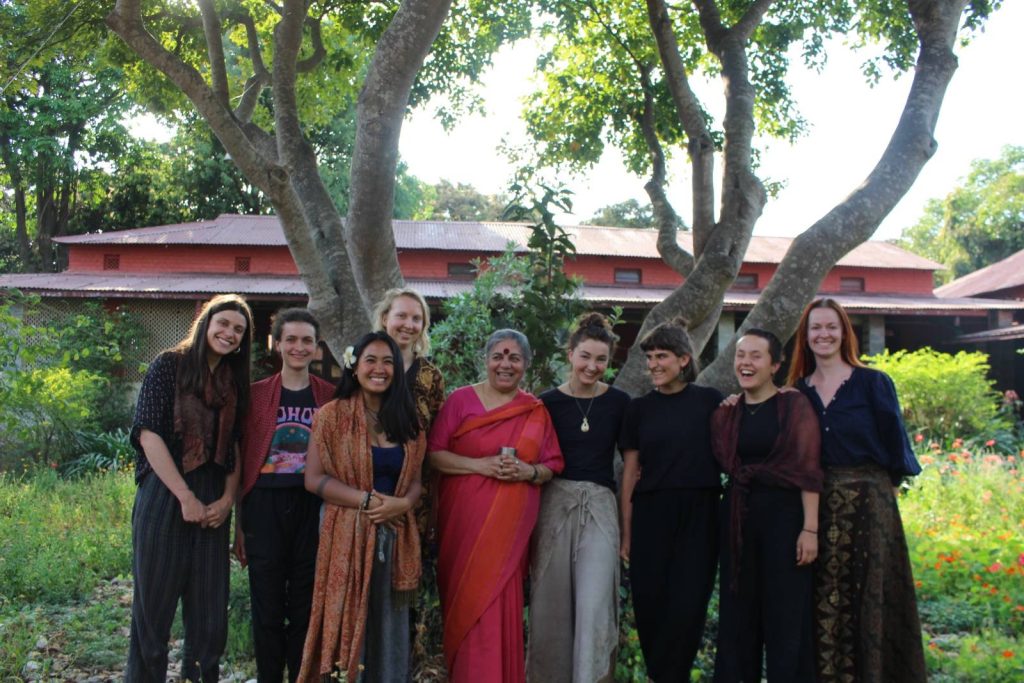
Navdanya
– India –
Navdanya is a Farm in the north of India, founded in 1987 by dr. Vandana Shiva to fight against the consequences of the green revolution in India, which brought a lot of harm to soil, plants and citizens and created a strong dependency of the farmers on big companies like Monsanto. By cultivating indigenous varieties and saving seeds in so-called “seed banks” all over the country, Navdanya supports farmers to regain their independence, create more biodiversity, and take back the commons that got stolen from the Indian population in the last decades. Today, Navdanya created a global network and works together with female farmers in almost every country state.
About my Experience:
Coming to this place was a long journey. After flying for hours, we landed in New Delhi – a vast city full of smog, chaos and noise, but super alive. From there we took the train and looked for 6 hours out of the window into the people’s lives. I never experienced a train ride where you are so close to the people living there, looking right into their daily reality. The air stayed dusty, we saw people hanging up laundry, dancing on the roof, throwing colours on their faces (we arrived on the day of the Holi festival). But we also looked at so much trash on the streets and the poverty that the people live in, constantly breathing in this dusty, grey air.
Arriving at the farm felt like coming to a bit of paradise. We entered a world of colourful flowers, blue sky with clean air, green birds flying around and the sound of the humming insects living there. Even on the last day here, I am still amazed by the beauty of this place. The impressions you get when you walk across the farm are the best proof of how this way of farming supports biodiversity by showing this massive spectrum of different colours, plants, trees, and animals.
With time, we got to know all the people that work at the farm. In the first few days, I was so inspired by the wisdom of this place and the knowledge the people hold, given from generation to generation. Coming from a place where people expect you to study after school to gain a deeper understanding of a field, it was just so cool to see how much you can learn from a place. What would the world look like if we still asked and listened to our ancestors? I thought about this question a lot. Being at Navdanya made me realize that this is a place where true knowledge can be found.
But it was not only the work and sessions that inspired me. Small things like washing our clothes with nuts from the soap nut tree and cleaning our dishes with a sponge gourd-plant, making natural pest- repellant out of plants from the farm, using different leaves, seeds and herbs for any health issue… The farm just really showed me how it’s possible to make everything myself with the help of nature. No plastic needed, no chemicals. It was lovely to experience that another way of living in balance with nature is possible, especially in a country like India, where you see mostly the complete opposite happening today. And to see how powerful it is. It was such a nice experience to produce our own food, know what is in the things you eat, make compost out of the things you can’t use for cooking and with it give good nutrition to your plants. I never felt so much like being a part of this cycle of nature. And seeing how the Indian farmers use this to fight against monoculture and gain their independence back because they keep their own seeds just made me feel like Navdanya is doing the work needed so much in India.
I learned so much from my time in India. More than I could ever write down here, but I can say that I always want to grow my own vegetables from now on. To make things myself, to listen and to learn. And I am sure, one day, I’ll have my own farm. And I also want to bring back what I learned, sew the seeds that I got at Navdanya, and spread the awareness and knowledge I gained through this experience.
by Rike Altmann
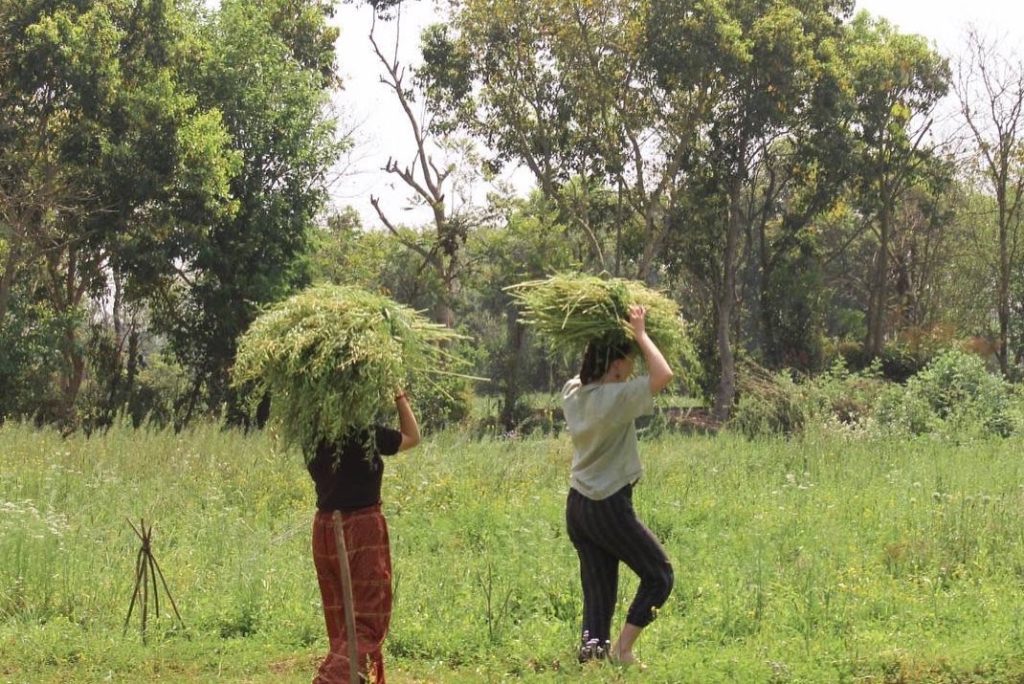
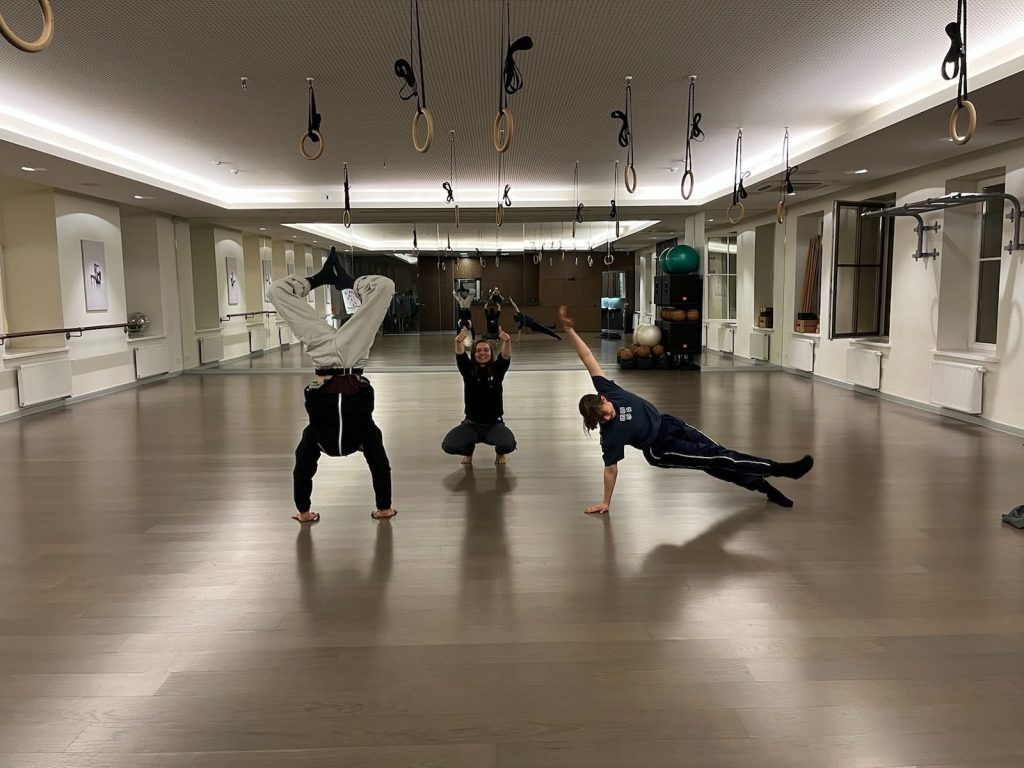
Movement Vilnius
– Lithuania –
Marlene: Movement Vilnius is a movement school born out of the need to rethink physical culture. They want to support and promote the idea of a universal culture of movement in a holistic way of thinking and provide the tools, methods, and daily practices necessary to realize this idea. All people of any age are very warmly welcomed to the MOVI-Community, as they call themselves. Vilnius itself is quite a small, cute, walkable city. You can see the top of a church on every street corner in the old town, and a little river goes through the center. We lived in the old town, where the streets were narrow and winding.
One of my biggest learnings was that it is so much more motivating and exciting to “train” your own body through a lens of curiosity towards what is possible—exploring and digging deeper, pushing and falling, standing up and trying again. – That is the energy I felt during the last two weeks. One of the quotes I remembered: We are not progressing, also not gaining anything, there is not an end to it, not one perfect result -> it is about being in tune, always!
Elia: It changed how I see my body and how I interact with it and other people. The idea of movement clearly shows that we can learn a lot about our bodies just by sitting with different physical challenges while being in exchange with other people. Also, if it is just watching them since I have to spend a month in the MOVI – Community in which I joined all the courses, I started to see my physical doing as a learning process for the rest of my life in which I can only learn by challenging myself and learning through exchange with others.
So, it is never about achieving any goal. Instead, it is about seeing the study of our bodies as a personal practice that we have to face every day if we want to live a sustainable and healthy life.
The coordination of our muscles is super important to make our life free of pain and more energetic by having more fluent movements throughout the day.
Carlotta: As moving, dancing and physical activity, in general, is one of the biggest passions in my life, the internship at Movement Vilnius has been very inspiring to me in so many ways. Mostly I learned a new and different approach to how I move and why and with that started to unlearn a lot of patterns that I am conditioned with from competitive fields. Movement makes me more aware of being in my body and getting a sense for what and when it’s enough, where the limits of my physicality are, and how I can explore and expand them in a healthier way. We came up with many different questions and are leaving with even more. Some of them are how we can integrate movement into education and create a movement community wherever we are.
We are looking forward to the upcoming weeks in our self-designed curriculum, where we are hosting movement sessions almost every day to create this space for the Yippies here.
by Marlene Likar, Elia Annerwall and Carlotta Rosiny
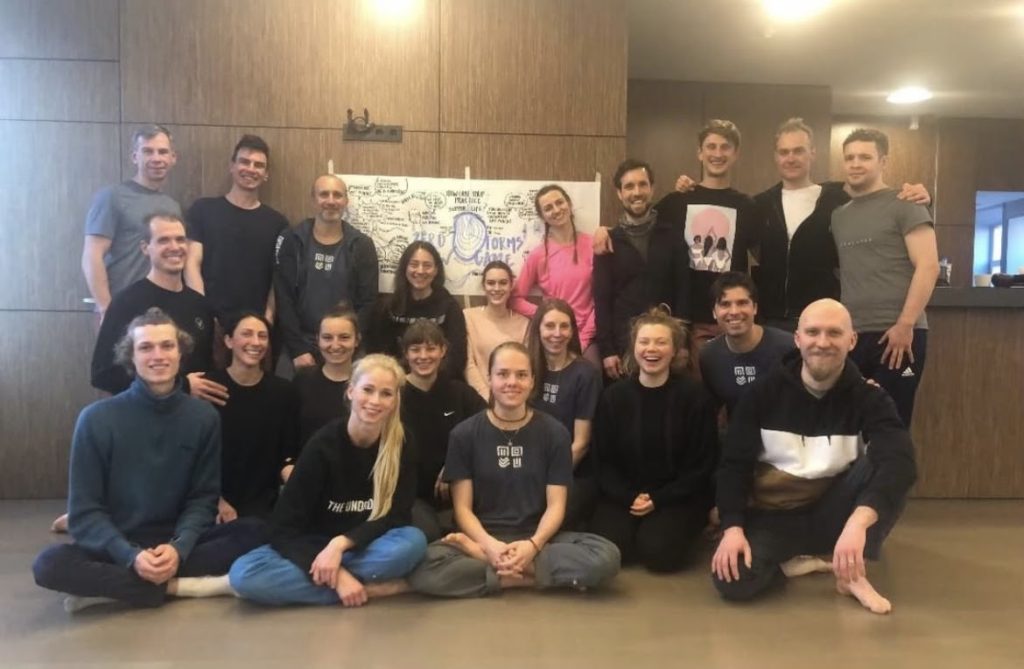
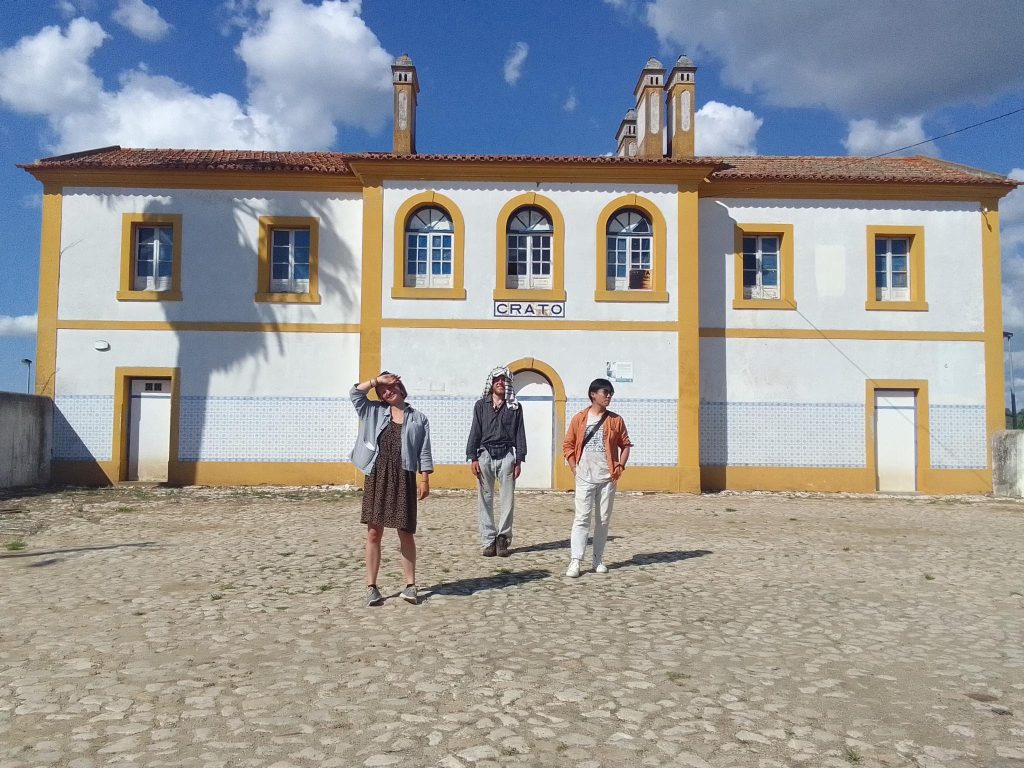
Waking Life
– Portugal –
Orange trees. Everywhere.
Some sour, some sweet.
Tap water tastes like chlorine.
Dogs barking, cats on the street.
Smiling old people without teeth.
Turtles, storks, javali.
Crackling firelogs. Metal beds. Cold feet.
Time stuck in honey.
Broken down houses for sale.
Ruins everywhere.
Emptiness. Space. Possibilities.
Faded torn posters on stone walls.
Bull fights.
Grass grows where blood used to flow.
But the village next door is preparing a new show.
Hands in fresh earth.
Spiders, scorpions, worms.
Soil sinks into my pores, my skin.
I breathe the earth,
the earth breathes me in.
The festival grounds.
The lake. Calm. Mirroring clouds.
Run down wooden stages.
Marked by time.
In a few months there will be 8000 people,
crawling like ants in the scorching heat.
Space, patiently waiting to be filled.
Yearning for the beat of dancing feet.
by May Wyss
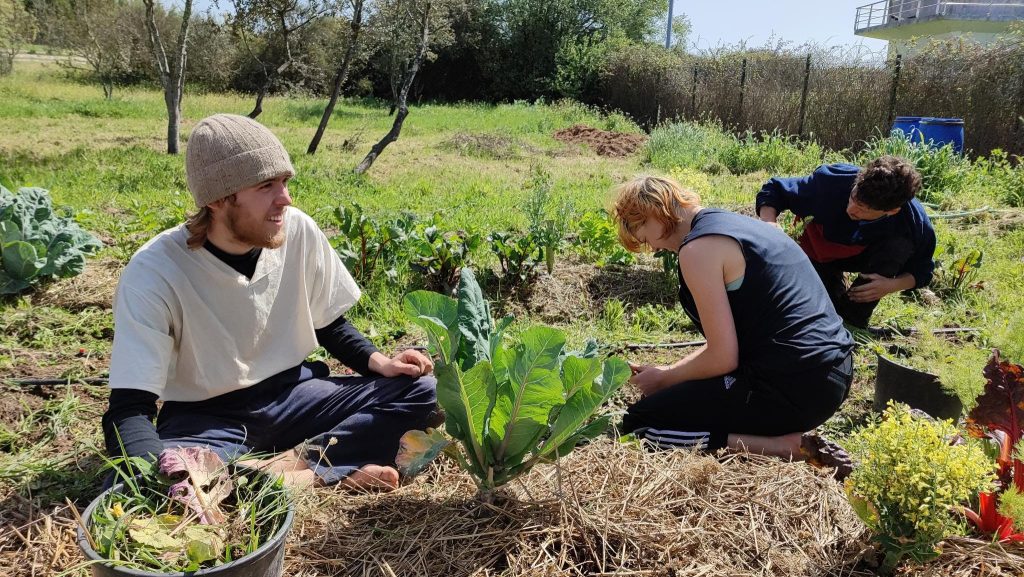
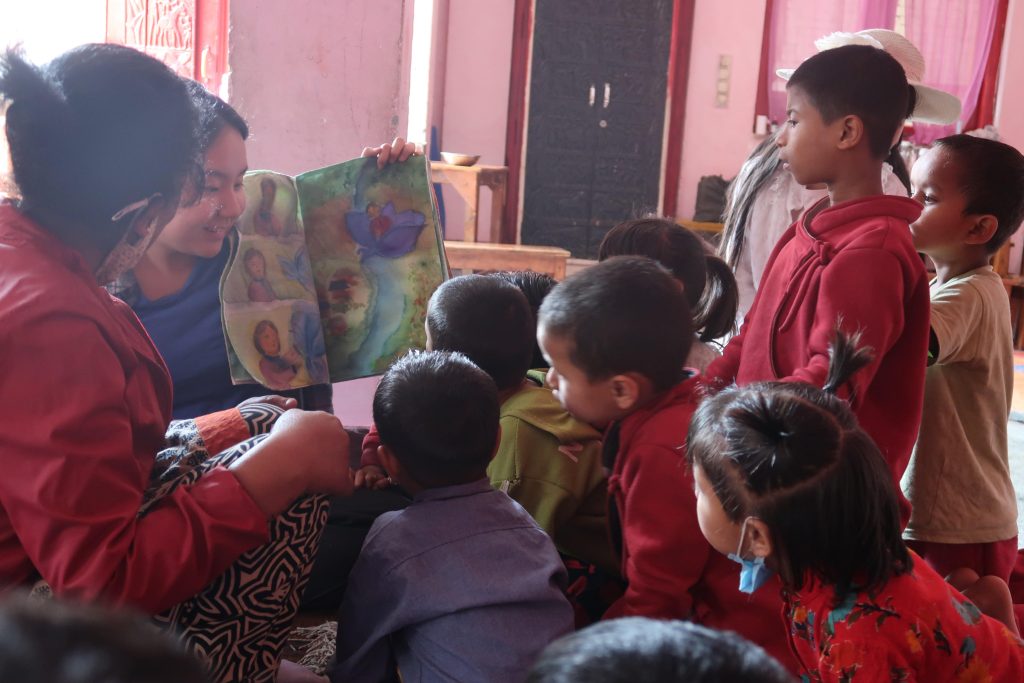
Shanti Lepra Hilfe
– Nepal –
Countless wings bear frail yet powerful bodies that soar above a city that stretches to the horizon, stopping only when met by hazy mountain feet.
The eagles never cry, only watch and listen, which is hard because the noise of horns, merchant voices, temple bells, and the bellows of great sacred cows must cloud even their sharp minds.
As they fly, do they spot Shanti below in the never-ending sea of rooftops? Each one jostling like countless waves in a never-ending storm, the buildings sway and touch until they come to a kind of calm in the tempest, a brief oasis filled with small chirping birds, smiling dogs, relaxed lizards, and wonderful flowers spilling down explosively painted walls.
There, the ringing voices of children echo off colourful bricks from classrooms and courtyards while women and men with sun-brushed faces stroll on uneven paved steps, Namaste engraved in their voices.
Sewing machines chatter and whirr at each other, having productive conversations occasionally interrupted by the bang of carpentry. Over it, all the wafting perfume of paint cascades down from the painting studio, and whooshes of fire glow from clay kitchen ovens.
The people laugh and dance, work and play, a smile never far away. The children ask for names and countries, favourite football players and fruit, a gleam in their beautiful eyes as other older ones linger nearby, not tempted to join, yet, content to listen to this strange other language the children have set in motion.
Sitting away from the gleaming sun with sweet tea to hand, many faces pass by, and stories with wings are released to fly as high as eagles through Kathmandu, following twisting roads that inevitably lead to mountain valleys gleaming rivers with little villages spattering the hillsides. People come into view, trudging a dirt road, hammering in a shop or seeding a field, each carrying dark burdens – some with their minds, and others with their bodies. Through most of these stories flies a great colourful bird that sounds its cry through the soggy mountain air, and the souls look up, and see the magnificent beast, light shining from within a radiant breast of many-coloured feathers. They raise their hands and hold on tight as they can, and are spirited an earth away to Shanti, to a home.
by Anika Jensen
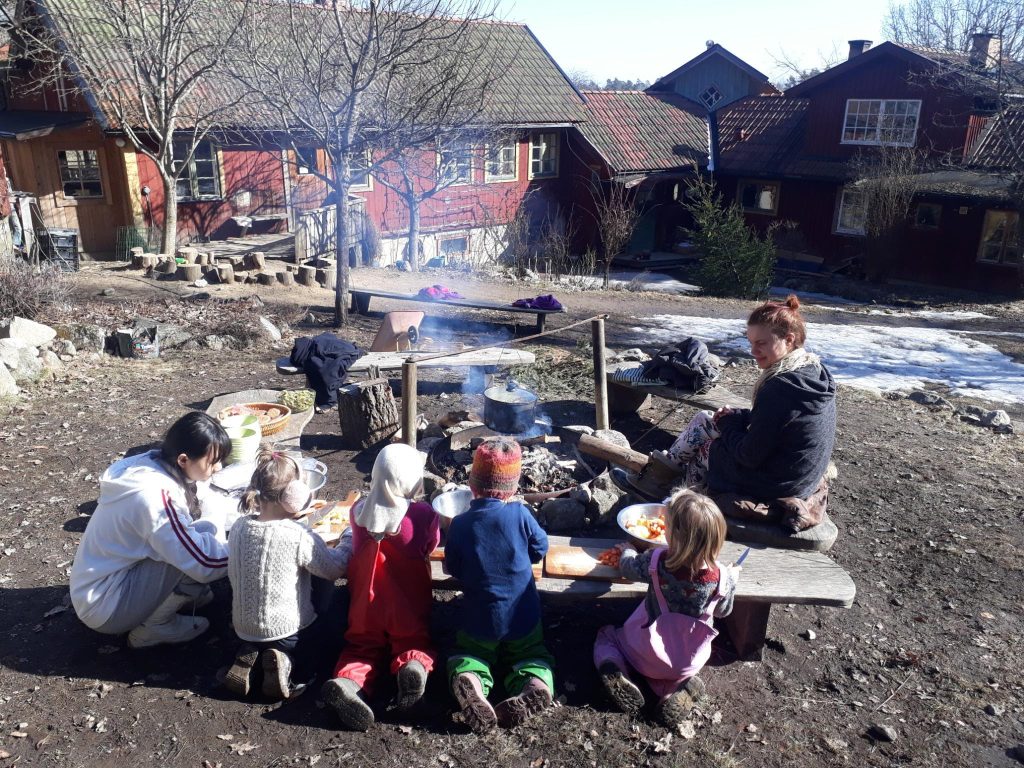
Nyponkulla
– Sweden –
Yuna: With just the two of us, we went to a holistic and Waldorf-inspired kindergarten only 10 minutes away from our campus. A place where creating a safe and free environment for children to explore and develop is the main focus. It is also just a very wholesome and beautiful place. For me, it was a time of slowing down, paying attention, following routines and soaking up Swedish culture (because, let’s be honest, YIP has its own, not very Swedish culture 🙂 ).
It was a challenge for me to adjust to life without the YIP community around me, knowing that everyone was spread around the most beautiful places in the world, but in the end, I gained a lot of new perspectives and learned a lot about myself! My days consisted of feeding the animals, baking bread, helping in the garden, playing guitar, and helping at Nibble farm in the afternoons. I loved working with kids in this natural and stress-free way, and this experience reaffirmed the deep love I have for children 🙂 I believe it is so important to let people play freely in nature and allow them to get lost in their beautiful fantasy worlds!
Vicky: My learning placement did not involve long journeys or exciting adventures, only a beautiful, plain, warm, and moving moment. When the first ray of sunshine in the morning fell on the earth, the birds in the forest shook their feathers, and the cat stretched. The sheep are bleating for straw. Open the door of the chicken house. Maybe you will find a surprise, a fresh egg!
But only when the children come, this fairy tale kindergarten is full of vitality. The children never seem to get tired. They run in the forest and play in the sand. Their little faces filled with happiness. Whenever this time comes, Yuna and I will sigh that the warmth brought by such a happy childhood will accompany the children all their lives, and they will become happy adults.
And when they climb on me and jump into my arms as they speak Swedish, it makes me confused. But, when they smile and look at me, I feel our hearts close together, they believe in me very much, and I love them very much.
I have read several books about children’s development, but I didn’t really learn until I came to Nyponkulla kindergarten. I absorbed water like a sponge all the time. Maybe this is the power of “action” and the meaning of the “learning placement” for me. Feel with heart, communicate with others with love and sincerity, work with my hands, learn and reflect with my mind.
In the communication with these fantastic teachers at the kindergarten, I not only learned how to become an educator, but also had a lot of new thoughts on “education” itself. As a teacher, never think about controlling or changing children. Just be yourself, a good environment, a good companion and supporter. I remembered what Dr. Steiner said, I once heard my high school teachers talk about it, but now it suddenly came into my mind: “All education is self-education. Children educate themselves in the environment. Teachers are only a part of the environment. Teachers should strive to become the best environment, and children will naturally grow into themselves and find their own way.”
by Yuna von Dongen and Vicky Si
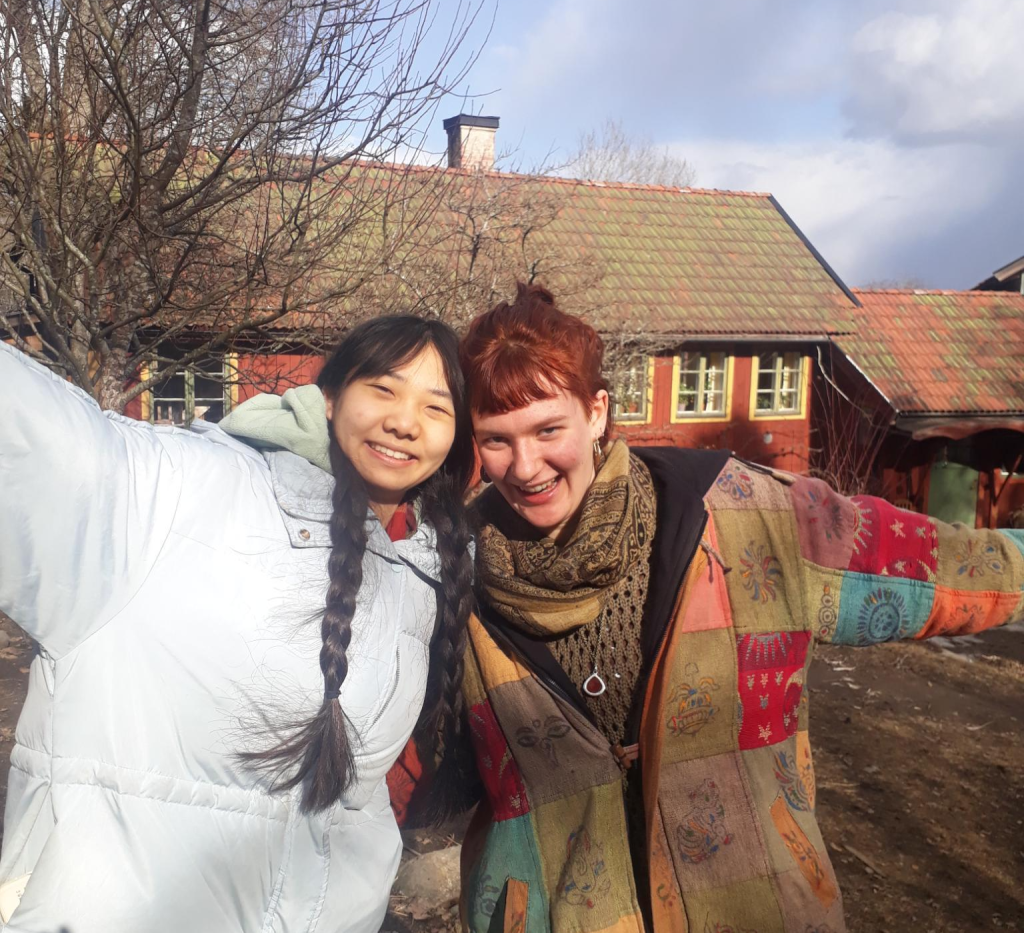
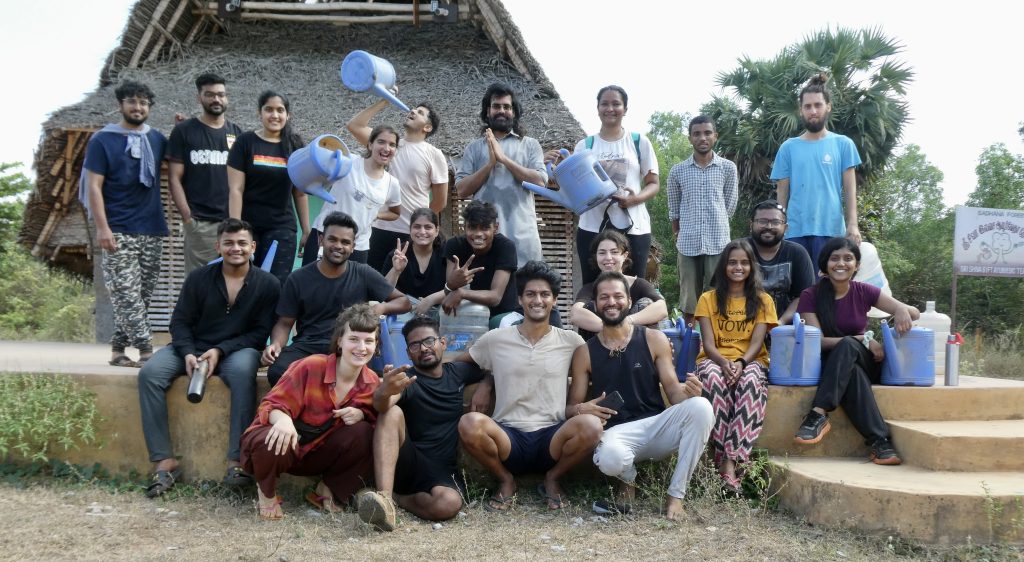
Youth Innovators Foundation
– India –
March 2022. Edda, Shirin and I fly off to Mumbai, India. A vibrant city where none of us have been before. Avani and Ritika, our hosts, welcome us at the airport. It’s nice to finally meet them in real life, and I immediately feel very welcomed and excited to create our journey together for the next four weeks.
It feels as if I arrived in a whole new world, a big city with so much life. It’s the middle of the night, and it’s crowded. Everywhere. Literally everywhere. The traffic is wild and chaotic. I can’t figure out whether there are any traffic rules. You just drive wherever there is space. But, to my surprise, it seems to work very well. Cars, rikshaw’s, cows, pedestrians, dogs, bicycles, and loads of motorbikes seem to navigate and form one living organism. The city is never asleep.
Together we drove to Ritika’s apartment, next to the national park in the center of Mumbai. Here we will spend our first coming week together. This week we will be busy organizing and creating ‘Project I: a learning journey in Auroville’.
Ritika is a young woman, born in Delhi, raised and always lived in Mumbai, even though she has travelled across the world. With an amazing view over the national park, a green oasis, as far as I can see. It feels like a calm and sincere place in the middle of an always-moving city. Regarding the size of the apartment, it feels very spacious. It’s rather inconvenient for a (young) woman to live on her own, without a partner or family. In my belief, that says a lot about Ritika, who fought for her independence in spite of judgements from her neighbours and contractionary to the cultural expectations.
At the age of 16, she founded, together with her younger sister (I know, crazy, right?!), her own organization, called YIF (Young Innovators Foundation). Their primary focus is to work with indigenous children from the national park. The educational approach is rather playful and inventive. Together with the teachers and students, they created multiple classrooms across the National Park to learn and explore.
While visiting the children in the park, we get an insight into how the differences in mentality, rituals and habits are remarkable between the villages, which are sometimes only a few 100m separated from each other. Each village has their own god they worship and their own temple.
The next three weeks we will be spending in Auroville. This is an experimental city in the South by the coast. This is a place founded by ‘The Mother’ and’ Sri Aurobundi’ in the ’80s. The intention of this place was to create an international community where everyone could live together in peace and harmony without practicing any religion.
Together with a group of 12 alumni from YIF, Ritika, Avani and the three of us started our project Í. This is a three-week learning journey, where we will focus on Í, community, world, and again centring back to the Í. In the first week, we will explore plant observation and biography work. Next week we visit another community, ‘Sadhana Forest, based in Auroville. We encounter the challenges of opening up our small community and merging into a bigger community. The daily tasks we join are reforestation, watering trees, feeding the cows, or helping out in the kitchen with Dina. Every morning we have ‘service hour, also called ‘Seva’ before breakfast, where every one of the community executes their task in service of the greater community as an act of selflessness. It’s inspiring to experience another community from the inside and explore how they work. During this time, I held a lot of questions about what it means to live in a community where everyone has the space to explore their authentic self: Which structure allows maximum freedom? How can I be, for you to be free?
Coming back to our smaller community after this week, we reflect a lot on our learnings and challenges. Sooner than expected, the four weeks passed by, and it was already time to fly back to Sweden. It was an indescribable experience which taught me to live more true to myself.
by Kato van Goethem
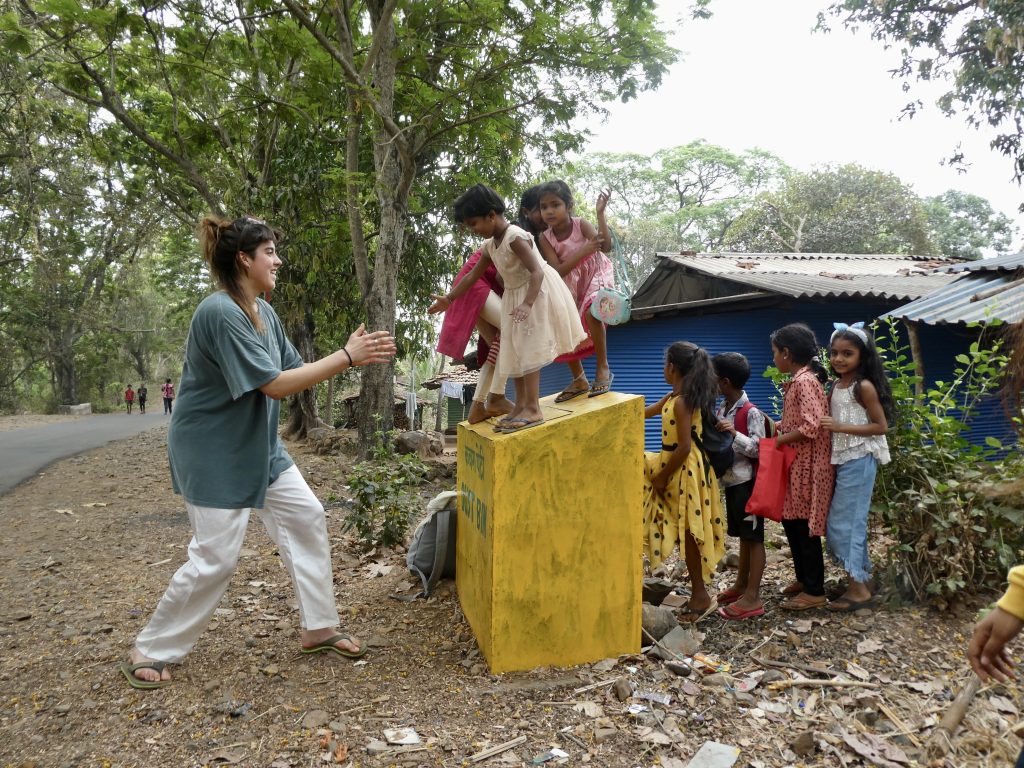
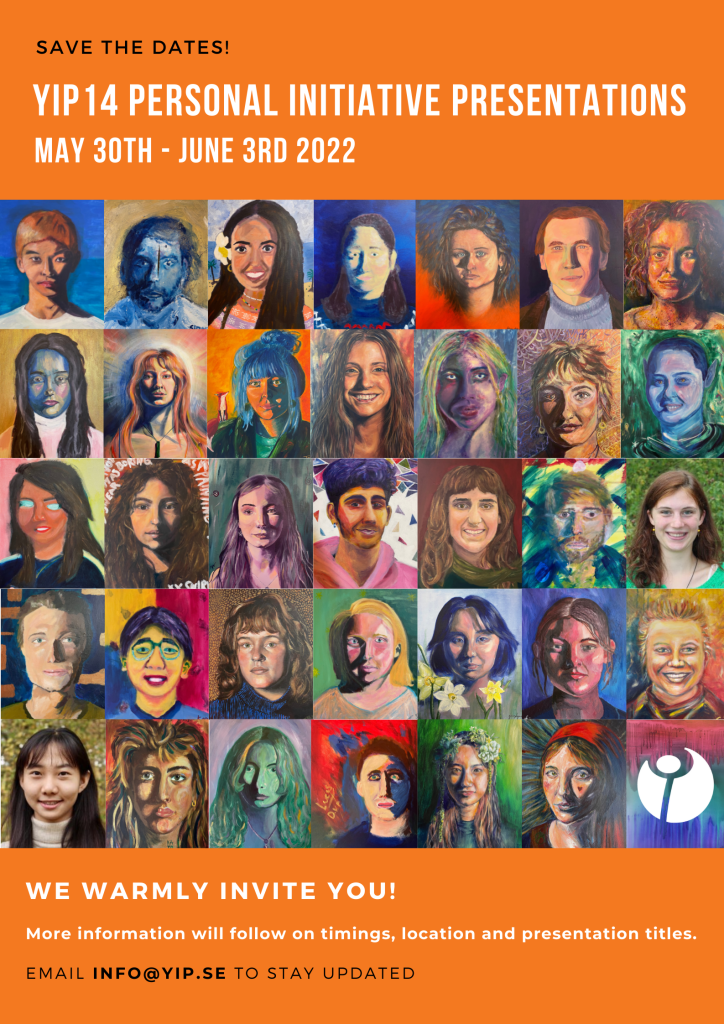
We warmly invite you to YIP14’s Personal Initiative Presentations happening from Monday 30th May to Friday 3rd of June.
Throughout the year the participants have been working on a personal initiative to develop a question, theme or project that inspires, challenges and excites them. The last few weeks of the self designed curriculum has been full of activity with many initiatives coming to life and questions being explored.
We look forward to witnessing them in community as they share their process, their questions, their struggles and findings.
The presentations on Tuesday 31st May and Thursday 2nd June will be made public on Zoom for those who cannot come in person. Please email [email protected] for the Zoom link.
We will share more details on location, timings and presentation titles soon!
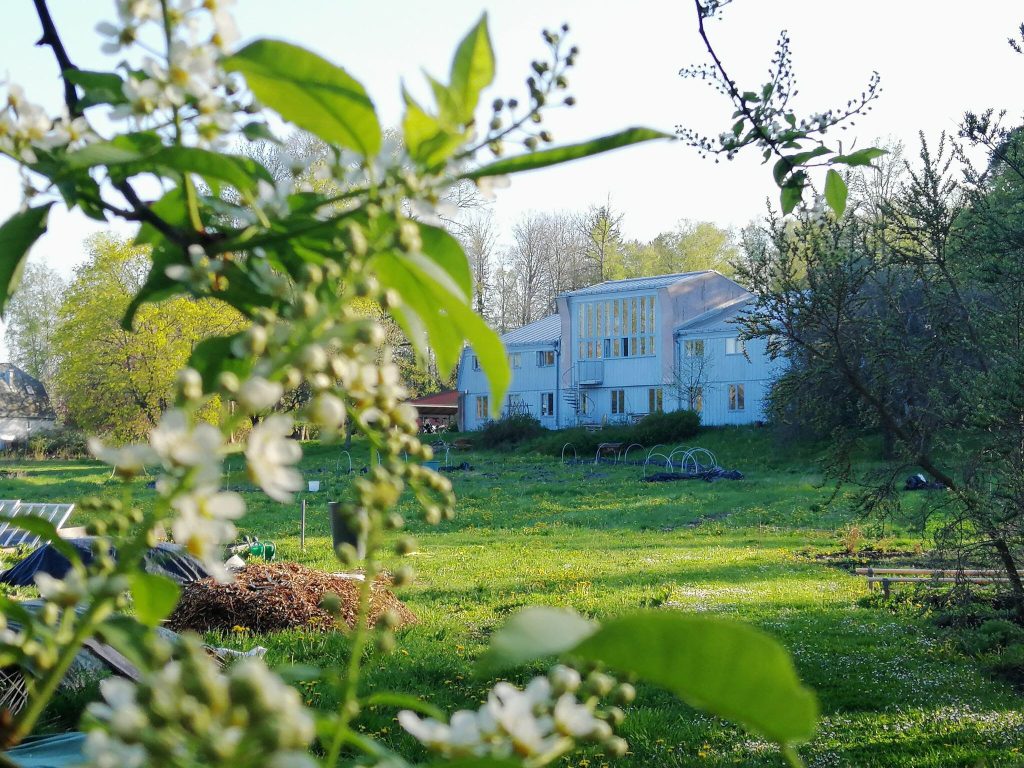
YIP15 Application Update
We are excited and grateful for the many applications that have come through for YIP15. Thank you to everyone who expressed interest in YIP and have applied for the coming YIP year. It has been an inspiring process for us on the team to meet you through the words you write, the creativity and questions you express in many forms and mediums and the stories you share during the interview.
The cohort of YIP15 is almost complete! And there are very few places left.
The final deadline for applications is June 15th, however, we are accepting participants on an ongoing basis and expect to fill the positions before this date. Once the maximum number of participants has been reached, applicants will be placed on a waitlist.
Please feel free to reach out to [email protected] if you have any questions about YIP or the application process.
Love from the Organising Team
